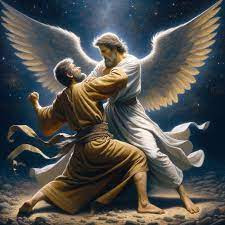The period leading up to and including Rosh Hashana and Yom Kippur is one during which observant Jews traditionally scrutinise and attempt to improve in all areas of their religious conduct. It is common to find minutiae of laws and stringencies which are disregarded for most of the year suddenly becoming the focus of attention as people make special efforts in order to secure a favourable judgment.
Set against this backdrop, I have long been surprised by the widespread willingness of worshippers to recite prayers in the Selichot which many of our leading rabbinic authorities have declared to be deeply problematic. One who petitions an angel in prayer appears to be in breach of Rambam’s fifth Principle of Faith which demands that one who prays direct all his thoughts to God, and not to angels – even to act as intercessors. Nor can this be regarded as a Maimonidean peculiarity based on any alleged rationalist or philosophical agenda. One of Rambam’s most fierce critics, Ramban, writes similarly that “The third form of idolatry is considering angels capable of serving as intermediaries between God and His worshippers. Realise that even to pray to them for this purpose is forbidden to us.”. Other significant figures who have expressed opposition to these prayers include Maharal (who amended the wording) and Chatam Sofer who did not recite them.
While it is possible to draw support for this practice from various aggadic sources (a methodology which itself can be strongly questioned) my difficulty remains. At a time of year when we are adopting stringencies and striving for perfection – why do so few people appear to be concerned with prayers which many of our most revered sages categorise as idolatrous?
When it comes to the Machnisei Rachamim passage, I can understand the position of those who consider that this falls outside the parameters of prayer to an intermediary. The prayer opens by requesting that those who bring prayers of mercy before God should “usher in our [plea for] mercy before the Master of mercy”. This can be understood to embody a rhetorical flourish to the effect that the process already in place for prayers to reach God should function in the correct way. For the avoidance of any doubt, the passage concludes with a direct request to God “Speedily answer us, O God…”. More troubling, however, is the ”Malachei Rachamim” piyyut, which openly implores angels to entreat God on our behalf and contains no direct prayer to Him.
The broader feeling among those who support the saying of these prayers is partly motivated by an unwillingness to tamper with and remove parts of a liturgy which have been popularly recited for many centuries and which are an established part of the service. In addition, they add that these passages are a small part of a greater service which is clearly addressed to God; they serve to stir the heart and emotions and sometimes have moving melodies attached to them. Should such popular expressions of religious fervour therefore be sacrificed merely to appease those who indulge in an over-zealous philosophical witch-hunt?

Responding to this immense Maimonidean project, Rav Hirsch writes:
“Scholars have philosophised about these expressions [anthropomorphism], in order to keep us far from ascribing to God material features. This gives rise, however, to the danger that the Personality of God will become increasingly blurred and indistinct to our perception. Had that been the Torah’s intention it could easily have avoided such expressions … Belief in the Personality of God is more important than the speculations of those who reject the attribution of material features to God.”
In a similar vein, Rav Hirsch was firmly in favour of the recitation of these Selichot passages – even attacking those who criticised a “widespread theme of piyyutim” on the basis of mistaken theological concerns.
On a personal level, I think that those searching for seasonal stringencies could do far worse than strengthening the boundaries which separate Judaism from idolatry. Justifications and reasonable sources may be found to excuse those who recite these prayers. But, in an age in which pilgrimages to graves and establishment of shrines are becoming increasingly popular among those seeking spiritual experiences, and with the distinctions between proper and improper prayer often blurred, my personal stringency for this year will be an attempt to state and emphasise publicly the words of Ramban that “The third form of idolatry is considering angels capable of serving as intermediaries between God and His worshippers. Realise that even to pray to them for this purpose is forbidden to us”.
First posted on Facebook 18 September 2022, here.








